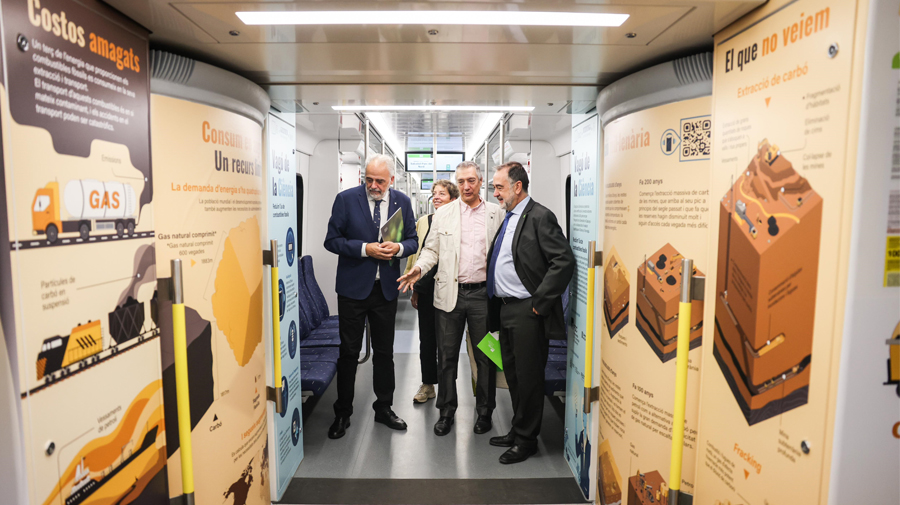ICTA-UAB raises awareness on the need to reduce fossil fuels in the UAB Science Wagon
The UAB Science Carriage, dedicated to the need of reducing the consumption of oil, carbon and gas, and increasing that of clean and renewable energies, was launched this week with the active participation of many ICTA-UAB researchers.

This year's edition is supported by fifteen ICTA-UAB researchers, who have been actively involved in providing scientific advice on the contents, appearing in some of the podcasts that can be listened to, or as speakers in the Expert Seat. The wagon is part of a Ferrocarrils train on the Barcelona-Vallès line that will run during the 2024-2025 academic year.
The Science Carriage is a co-creation laboratory for scientific and technological dissemination, it is a place where topics of general interest in which research and innovation are fundamental are addressed, with the aim of reaching the public and improving scientific and technical education in society.
Among the issues it will address this year are the impact of fossil fuel consumption on biodiversity and human health, alternative energies, climate justice and responsible consumption. It also includes the participation of researchers from the UAB Departments of Animal Biology, Plant Biology and Ecology; Geography; and Chemical, Biological and Environmental Engineering, and the CREAF.
Infographics, podcasts and dialogues with experts
The carriage, which is vinyl-covered on the outside with the name of the project, "Vagó de la Ciència", contains information and illustrations related to the reduction of fossil fuels consumption, which can be expanded in audio format using the QR codes available. The contents include ten audio guides that address cross-cutting issues such as the origin and use of fossil fuels, their impact on biodiversity and human health, and alternative energies.
There is also a series entitled El pòdcast del Vagó, with 16 chapters, available on the Science Carriage website and on the Spotify and Ivoox platforms, with interviews with researchers on topics in their field of study.
Six of the chapters feature ICTA-UAB researchers Anna Petit, Verónica Arcas, Pietro Tonini, Raúl Velasco, Laura Pérez Sánchez, Cristina Madrid and Gemma Morell. Some of the issues they address are climate change and biodiversity, the challenges of the energy transition, climate justice, regenerative agriculture and responsible consumption.
The Science Carriage once again will be offering the Expert Seat, an initiative that seeks to encourage interaction with users and in which a researcher periodically occupies a seat in the carriage during the train ride between Plaça Catalunya and the UAB to answer questions, exchange experiences and maintain a dialogue on their field of knowledge.
This year the proposal will take place every Thursday during the months of October and February. ICTA-UAB researchers Cristina Madrid and Gemma Morell will participate in this initiative.
The ICTA-UAB researchers involved in this edition are Verónica Arcas; Alba Badia; Enrico Chiogna; Xavier Gabarrell; Cristina Madrid; Núria Moraleda; Gemma Morell; Pablo Núñez; Anna Petit; Isabel Pont; Laura Pérez Sánchez; Berta Roset; Valentí Rodellas; Mateu Sanclemente; Pietro Tonini and Raúl Velasco Fernández.
All the informative material of the Science Carriage is accessible through the project's website: www.uab.cat/vago.